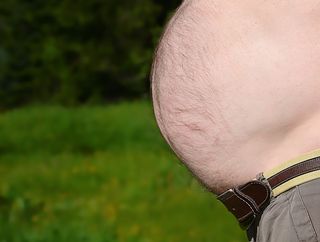Genetics
Don’t Believe the Hype — Dad Bods Are Not Sexy
The science of sexy.
Posted November 23, 2015 Reviewed by Ekua Hagan

Several months ago, one of my students told me about the whole "dad bod" thing. I dismissed it pretty quickly as a temporary phenomenon that would pass in a week or two. It didn’t. It’s now nearly the end of the year and I’m still seeing the mindless proliferation of this nonsense.

Earlier this year, a 19-year-old college student by the name of Mackenzie Pearce wrote a blog post entitled "Why Girls Love the Dad Bod." In it, she suggests that “girls are all about that dad bod” (the "dad bod" being defined as“a nice balance between a beer gut and working out”). The questionable conclusions she has come to are apparently largely based on observations of guys that her roommate found attractive.
The science just isn’t with her here. And what’s more, it doesn’t make biological sense. I have no interest in criticizing Mackenzie Pearce, but I do have an interest in pointing out that the "dad bod" is unhealthy and unattractive.
But what’s the harm? Surely people can offer up a point of view without it having any seeming basis in fact? No one’s getting hurt; it’s just a bit of fun, right? Normally, I would agree. You could quite easily spend your life refuting internet misinformation and be none the better for it. I’m not suggesting that the author is deliberately disseminating inaccuracies. The issue here is not that her arguments are predicated upon weak nonscience and flimsy conjecture, but that her original post has been shared nearly 540K times and spawned a multitude of posts describing the "dad bod" as attractive. The popularization of this mistruth is dangerous and borderline irresponsible.
Before going on, I should make it clear that I am a dad. Like the overwhelming majority of men, I have neither washboard abs nor bulging biceps, and would really like it if the body that said, "I go to the gym occasionally, but I also drink heavily on the weekends and enjoy eating eight slices of pizza at a time" was attractive.
It’s reasonable to suggest that there is some kind of psychological appeal to a man who is a little bit chubby. But this is not what is being suggested. Women like long walks on the beach and Oprah Winfrey, but this does not mean that they are sexually attracted to either. The biological imperative to pair with someone that is healthy cannot be ignored. A paunchy gut and saggy pecs just don’t scream out "health!"
Why the healthy male body is more attractive
There is overwhelming evidence that men (and women) are sexually selected on the basis of whether or not their physical characteristics indicate good genes. Saying someone is "hot" is really shorthand for suggesting that they are genetically superior.
Describing the "dad bod" as attractive is kind of like giving the gold medal to the guy who comes in last place at the Olympics.
Scientific research strongly suggests that muscularity is desirable in a male physique, and this makes perfect sense. Of course, you want to romantically align with someone who has good genetics and is healthy. Your kids will probably also be healthy. There is just no escaping the fact that muscularity, a sign of health, is sexy. Compared to non-muscular men (the "dad bod"), muscular men report more lifetime and short-term sex partners and are generally more desirable to women.
The ideal male body image, a healthy-looking, muscular physique, didn’t become "ideal" by accident. It’s attractive to women. To be sure, too muscular and ripped is a turn-off (think Mr. Olympia), but so is too skinny (think Christian Bale in The Machinist) or too squishy (the "dad bod"). An optimum exists, but it isn’t the "dad bod."
What truly makes dads attractive
Dads do have something going for them: They’re good with kids, or at least, presumably better than guys without any parenting experience. Research strongly supports the idea that being "pro-children" is highly desirable among men.
And to be fair, men’s desirability for long-term relationships is determined more by earning potential and commitment, and less by physical attractiveness. Established male parents would likely be, on average, more committed to their relationships than would sought-after philandering hulks.
I think most men would prefer it if attractiveness could be achieved through pizza-binges and beer-lunches rather than hitting the gym and eating healthily. The truth is, healthy = sexy, and always will.


